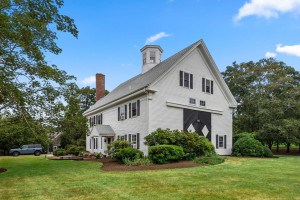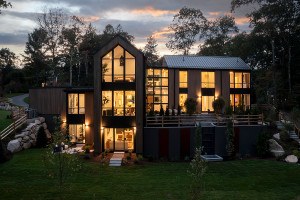Norman Leventhal Park Dubbed a ‘Great Public Space’

Post Office Square Photo by abbyladybug on flickr
On Wednesday, the Massachusetts chapter of the American Planning Association (APA) joined community members and city leaders to celebrate the designation of Norman B. Leventhal Park in Post Office Square as a “Great Public Space,” part of the APA’s national Great Places in America program. On hand to accept the award were the park’s founder and namesake Norman B. Leventhal and representatives from the Friends of Post Office Square, the civic organization that led the transformation of an above-ground parking garage into an oasis of green space in downtown Boston decades ago.
The park opened in 1992, 10 years after Leventhal first suggested the idea of replacing the three-story, 950-car, street-level cement behemoth of a garage in the center of the Financial District with a new $80 million, 1,400-car garage, but with one key change: the new garage would be underground, with a 1.7 acre park above, offered for free to the city. At the time, Leventhal was the chairman of the Beacon Companies, a blue-chip real estate development and investment firm that had been a part of the Boston business world since the days following World War II. Beacon Companies was the force behind Rowes Wharf, Center Plaza, the Meridien Hotel, and others.
The project, unique at the time for the public/private relationship, quickly became more than just a place to park cars. The ugly eyesore that was the focal point of the open square became a grassy respite which was quickly adopted for use by area office workers, thanks to Leventhal. There are probably people who don’t even realize that more than a thousand cars are underground below them. On the land above, there is, according to an award grantee, “a fountain, sculpture, a colonnade, polished granite walls and landscaped borders. The parking facility includes a shoe-shine station, clean restrooms, a car wash and an automated checkout system for drivers.” The Wall Street Journal jokingly called it the “Garage Mahal.” The Park has been earning awards year after year.
Leventhal deserves more praise and recognition than he’s received from Boston and its residents. He’s long been a member of the community and a force in making the city better for many years. We easily forget the situation Boston was in during the 1960s and 1970s when nothing was being built and few had faith in the city. He and his company were there, then, and have been ever since.
You can see the results of his hard work by touring the Norman B. Leventhal Walk to the Sea, created in 2008, which goes along Beacon and Tremont Streets to State Street and on across the Rose Kennedy Greenway to the Boston Harbor. Eight kiosks are set up on a mile-long path to guide you along the route. Few who live here have reason to know about it, but tourists use it every day—if not every hour.
His greatest and most-lasting achievement is the Norman B. Leventhal Map Center at the Boston Public Library, “a collection of 200,000 maps and 5,000 atlases for the enjoyment and education of all through exhibitions, educational programs, and a website that includes more than 5,500 digitized maps.” You can search and view historic maps of the world, from the 15th century to the present. For Boston alone, you will find the maps drawn when the Puritans first hit Massachusetts Bay, through the 1700s, 1800s, and early 1900s, as well as maps covering the New England region, American Revolutionary War period, nautical charts, and world urban centers. For anyone interested in Boston history, it’s a literal treasure of information.
Post Office Square Park is not an example that can easily be replicated across the city. The Rose Kennedy Greenway stumbled while working out the kinks of its private-public partnership. Leventhal himself had trouble repeating his earlier success when he was put in charge of redeveloping Boston’s City Hall Plaza in the mid-1990s. That project went nowhere.
But just because it’s not an easy task doesn’t mean we shouldn’t try. The beauty and functionality of the Norman B. Leventhal Park reflects perfectly the efforts of one man whose goal was to make Boston a better place to live. A Friends group could mimic the Leventhal method to bring new life to underutilized spaces—like Copley Square, for instance.


